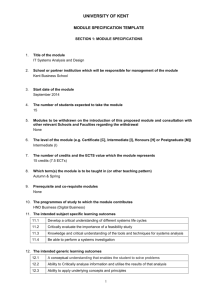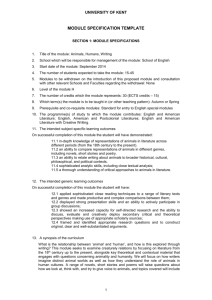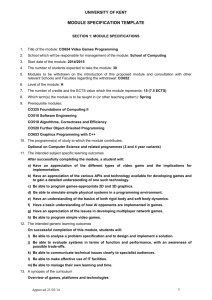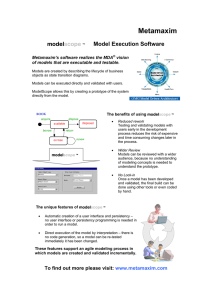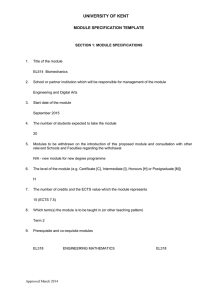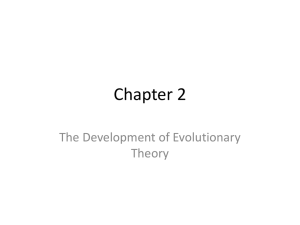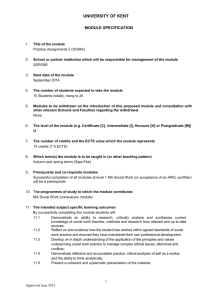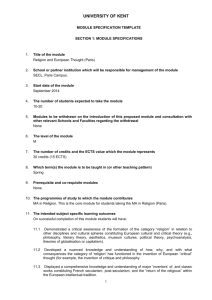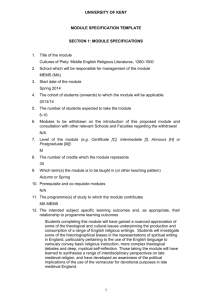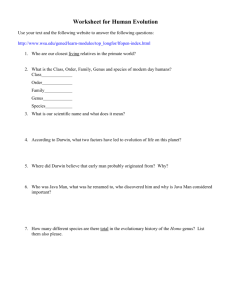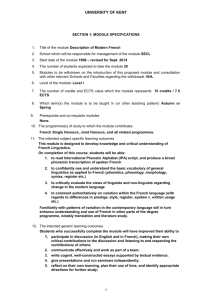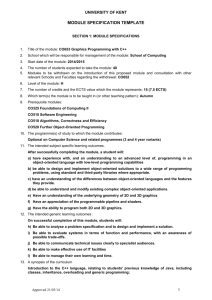University of Kent
advertisement
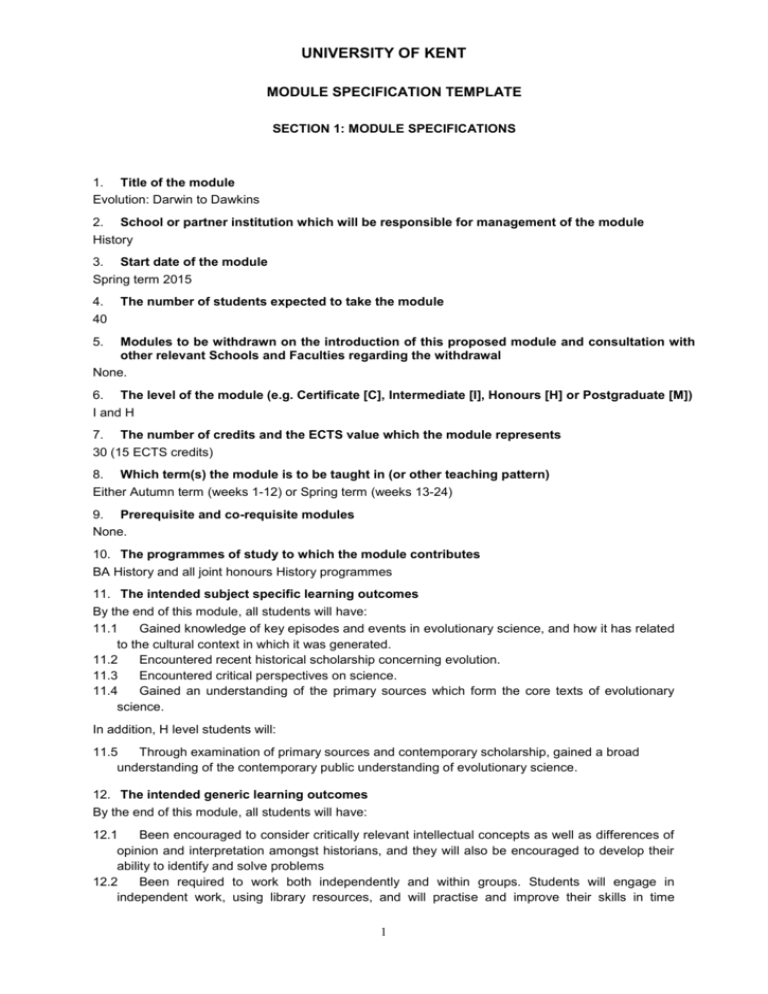
UNIVERSITY OF KENT MODULE SPECIFICATION TEMPLATE SECTION 1: MODULE SPECIFICATIONS 1. Title of the module Evolution: Darwin to Dawkins 2. School or partner institution which will be responsible for management of the module History 3. Start date of the module Spring term 2015 4. 40 The number of students expected to take the module 5. Modules to be withdrawn on the introduction of this proposed module and consultation with other relevant Schools and Faculties regarding the withdrawal None. 6. The level of the module (e.g. Certificate [C], Intermediate [I], Honours [H] or Postgraduate [M]) I and H 7. The number of credits and the ECTS value which the module represents 30 (15 ECTS credits) 8. Which term(s) the module is to be taught in (or other teaching pattern) Either Autumn term (weeks 1-12) or Spring term (weeks 13-24) 9. Prerequisite and co-requisite modules None. 10. The programmes of study to which the module contributes BA History and all joint honours History programmes 11. The intended subject specific learning outcomes By the end of this module, all students will have: 11.1 Gained knowledge of key episodes and events in evolutionary science, and how it has related to the cultural context in which it was generated. 11.2 Encountered recent historical scholarship concerning evolution. 11.3 Encountered critical perspectives on science. 11.4 Gained an understanding of the primary sources which form the core texts of evolutionary science. In addition, H level students will: 11.5 Through examination of primary sources and contemporary scholarship, gained a broad understanding of the contemporary public understanding of evolutionary science. 12. The intended generic learning outcomes By the end of this module, all students will have: 12.1 Been encouraged to consider critically relevant intellectual concepts as well as differences of opinion and interpretation amongst historians, and they will also be encouraged to develop their ability to identify and solve problems 12.2 Been required to work both independently and within groups. Students will engage in independent work, using library resources, and will practise and improve their skills in time 1 UNIVERSITY OF KENT management, historical research, organisation and analysis of material, oral presentations and essay-writing. 12.3 Acquired the skill to communicate complex concepts effectively through written work. They will acquire the ability to further develop skills they have already gained, which will be of use to them in future study or occupations 12.4 Acquired the skill to present information creatively and accessibly and using appropriate ICTs. In addition, H level students will: 12.5 Demonstrated the acquisition of an independent learning style, by showing the ability to reflect on their own learning and by mediating complex arguments in both oral and written form 12.6 Approached problem solving creatively, and formed critical and evaluative judgments about the appropriateness of these approaches 13. A synopsis of the curriculum During the past 150 years a variety of scientific methods and metaphors have been used to understand the ways in which species arise. Contrary to popular belief, Darwin did not cement this science in place. In the forty years following his death, natural selection was ‘eclipsed’ by a variety of understandings of evolution. Even after the so-called ‘new synthesis’ established by Julian Huxley, evolution remained an oddly contentious science, with sometimes vicious debates between scientists themselves, and between scientists and various sectors of the public (fundamentalists and feminists to name but two). How does knowing that we are related to animals change our view of human behaviour? Where was the cut-off between ape and human? Are all creatures inherently selfish or is there a place in nature for altruism? This module seeks to understand what was at stake in such debates, and how different accounts of evolution served the purposes of the contexts in which they were articulated. 14. Indicative Reading List Adrian Desmond and James Moore, Darwin. Penguin UK, 1992 Ernst Mayr and William Provine, eds. The evolutionary synthesis: perspectives on the unification of biology. Harvard University Press, 1998. Ronald L. Numbers, Darwinism comes to America. Harvard University Press, 1998. Peter Bowler, The Eclipse of Darwinism. Johns Hopkins University Press, 1992 James R. Moore, The post-Darwinian controversies: a study of the Protestant struggle to come to terms with Darwin in Great Britain and America, 1870-1900. Cambridge University Press, 1981. Robert E. Kohler, Lords of the fly: Drosophila genetics and the experimental life. University of Chicago Press, 1994. Evelyn Fox Keller. The century of the gene. Harvard University Press, 2009. Jim Endersby, A Guinea Pig’s Guide to the History of Biology. William Heinemann, 2007 Ullica Segerstråle, Defenders of the truth: The sociobiology debate. Oxford: Oxford University Press, 2000. Primary texts: Darwin, Origin of Species; J. Huxley, The New Synthesis; E. O. Wilson, Sociobiology; Dawkins, The Selfish Gene 15. Learning and Teaching Methods, including the nature and number of contact hours and the total study hours which will be expected of students, and how these relate to achievement of the intended learning outcomes Contact hours: 10 lectures (1 hour each) and 10 seminars (2 hours). There will be one writing week and one week devoted to individual essay return. Total contact time – 30 hours. Total private study hours - 270 300 hours in total. 16. Assessment methods and how these relate to testing achievement of the intended learning outcomes 2 UNIVERSITY OF KENT The module will be assessed by 100% coursework. Level I students will be assessed by: One 2500 word essay (worth 30% of the final module mark) and one 3500 word essay (worth 40% of the final module mark). Through the essays, students will be required to research a subject and to formulate and present their own opinions, displaying a critical understanding of relevant historiography [LOs 11.1-4; 12.1-4]. Two 800 word blog articles (each worth 15% of the final module mark), modelled on the HWord (guardian.co.uk) – i.e. each article should spring from a recent episode or debate concerning evolution, and give a historical perspective on it. [LOs 11.4; 12.1-4] Level H students will be assessed by: Two 3000 word essays (each worth 35% of the final module mark). Through the essays, students will be required to research a subject and to formulate and present their own opinions, displaying an advanced critical understanding of relevant historiography and primary sources [LOs 11.1-5; 12.1-6]. Two 800 word blog articles (each worth 15% of the final module mark), modelled on the HWord (guardian.co.uk) – i.e. each article should spring from a recent episode or debate concerning evolution, and provide a critical analysis and relevant historical perspective on it [LOs 11.1-5; 12.1-6]. The essays will be moderated in accordance with faculty conventions. Informal feedback will be sought as the module progresses. There will be a formal questionnaire at the end of it. On the basis of it, a report will be made to the School's L & T Committee, which will in turn report to the Staff/Student Liaison Committee. 17. Implications for learning resources, including staff, library, IT and space Library, IT and space requirements are not exceptional. 18. The School recognises and has embedded the expectations of current disability equality legislation, and supports students with a declared disability or special educational need in its teaching. Within this module we will make reasonable adjustments wherever necessary, including additional or substitute materials, teaching modes or assessment methods for students who have declared and discussed their learning support needs. Arrangements for students with declared disabilities will be made on an individual basis, in consultation with the University’s disability/dyslexia support service, and specialist support will be provided where needed. 19. Campus(es) where module will be delivered: Canterbury 20. Partner College/Validated Institution: 21. University School responsible for the programme: 3 UNIVERSITY OF KENT SECTION 2: MODULE IS PART OF A PROGRAMME OF STUDY IN A UNIVERSITY SCHOOL Statement by the School Director of Learning and Teaching/School Director of Graduate Studies (as appropriate): "I confirm I have been consulted on the above module proposal and have given advice on the correct procedures and required content of module proposals" ................................................................ .............................................. Director of Learning and Teaching/Director of Graduate Studies (delete as applicable) Date ………………………………………………… Print Name Statement by the Head of School: "I confirm that the School has approved the introduction of the module and, where the module is proposed by School staff, will be responsible for its resourcing" ................................................................. .............................................. Head of School Date ……………………………………………………. Print Name SECTION 3: MODULE IS PART OF A PROGRAMME IN A PARTNER COLLEGE OR VALIDATED INSTITUTION (Where the module is proposed by a Partner College/Validated Institution) Statement by the Nominated Officer of the College/Validated Institution (delete as applicable): "I confirm that the College/Validated Institution (delete as applicable) has approved the introduction of the module and will be responsible for its resourcing" ................................................................. .............................................. Nominated Responsible Officer of Partner College/Validated Institution Date …………………………………………………. Print Name ………………………………………………….. Post …………………………………………. Partner College/Validated Institution Module Specification Template Last updated October 2012 4
